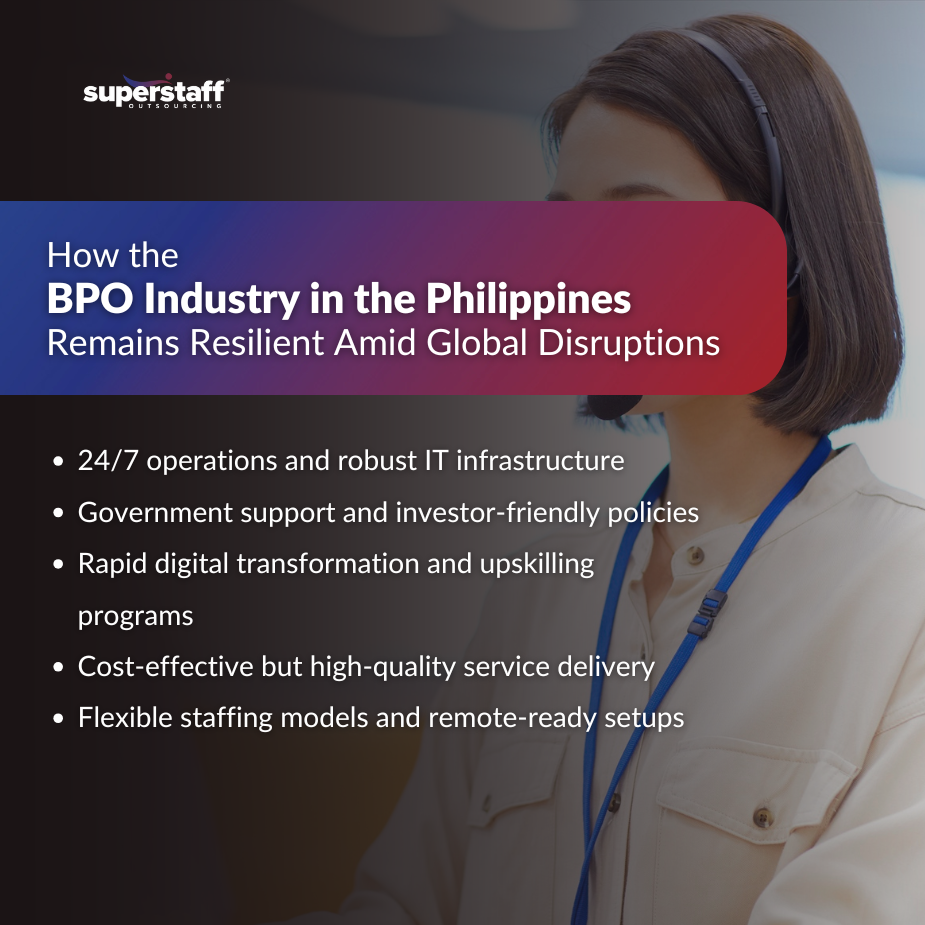
Global trade tensions are rattling supply chains, inflating costs, and pushing many industries into uncertain territory. But amid the disruption, one sector continues to prove its strength: the BPO industry Philippines.
As tariffs rise, trade routes shift, and geopolitical unrest strains global markets, companies worldwide are reevaluating their strategies. Manufacturing and logistics have felt the brunt of these shocks, with delayed shipments, cost overruns, and fragmented supplier networks becoming the norm. Yet, while many sectors scramble for stability, Philippine call centers remain steady.
Long recognized for their service excellence and skilled workforce, BPO industry Philippines providers have not only weathered the storm but continue to deliver consistent value to global clients. In this blog, we’ll explore the reasons behind the resilience of the BPO industry in the Philippines — and why more businesses are turning to this sector for reliable, scalable support in uncertain times.
Global Trade Disruptions Are Reshaping Business Priorities
Supply chains worldwide are being tested like never before. A volatile combination of tariff wars, port congestions, and shifting trade alliances has created a ripple effect across nearly every sector. From manufacturing delays to sourcing bottlenecks, companies are navigating an unpredictable trade environment that continues to evolve at a breakneck pace.
These global disruptions have forced businesses to rethink their operational models. Rising costs—due in part to increased tariffs and extended shipping timelines—have made it more challenging to sustain just-in-time manufacturing. Logistics firms are facing challenges due to congested ports and inconsistent cross-border regulations. In this era of global uncertainty, enterprises face immense pressure to develop new strategies that prioritize agility, continuity, and customer retention.
As these pressures mount, one sector is standing tall: the BPO industry Philippines. Unlike physical supply chains, the services delivered by call centers in the Philippines are not bound by cargo vessels or customs checkpoints. Their ability to provide consistent customer service, technical support, and back-office functions, regardless of global headwinds, is giving them a competitive edge.
Why the Philippine BPO Industry Remains Resilient
The success of the BPO industry in the Philippines isn’t accidental. It’s built on structural advantages that make the country an ideal location for outsourcing, especially in times of global instability.
A cornerstone of this resilience is the Filipino workforce. With strong English proficiency, a service-oriented mindset, and high cultural alignment with Western markets, Filipino professionals are uniquely positioned to handle a wide range of customer service tasks. This is particularly important for North American businesses that require precise and empathetic communication with their customers.
In addition to talent, the Philippines has invested in infrastructure and digital transformation. Government policies have long supported the growth of BPO operations, offering incentives to foreign investors and establishing tech-ready zones to facilitate smoother business operations. Training programs and public-private partnerships are also helping to upskill workers in areas such as artificial intelligence (AI), data analytics, and cloud computing, further enhancing the capabilities of Philippine call centers.
As the demand for seamless customer experience grows, these fundamentals help explain why the Philippines remains a stable outsourcing destination. When global trade creates chaos, companies need reliable partners who can deliver uninterrupted support. That’s precisely what Philippine call centers are doing—and doing well.

Outsourcing Across Industries: Philippine Call Centers Amid Supply Chain Disruptions
Let’s take a closer look at how specific industries are turning to call center outsourcing in the Philippines to offset the impact of global trade slowdowns.
Retail is one of the sectors most affected by supply chain delays. With inventory shortages and delayed deliveries becoming the norm, many e-commerce businesses have expanded their customer support functions to address growing volumes of inquiries, complaints, and return requests. Instead of hiring expensive in-house teams, these companies are leveraging outsourced call center services in the Philippines to manage customer expectations and retain loyalty.
Logistics firms, too, are experiencing firsthand the challenges of global trade disruptions. To maintain visibility over shipments and rerouting communications, these companies are depending on BPO providers to handle real-time track-and-trace services, respond to urgent customer queries, and manage documentation. Philippine agents are trained to handle these complex, time-sensitive interactions across multiple time zones, providing much-needed continuity in chaotic conditions.
Healthcare has also embraced call center outsourcing in the Philippines. With medical supply chains under strain and administrative backlogs piling up, U.S.-based healthcare providers are turning to BPO industry Philippines for claims management, patient support, and billing inquiries. These services are crucial in ensuring that patients receive timely information and that providers can maintain a steady revenue flow despite external challenges.
These examples underscore a trend: businesses aren’t just plugging short-term gaps. They’re forming long-term partnerships with BPO providers in the Philippines, recognizing their ability to scale services and maintain high standards even during global disruptions.
Stability in a Volatile World: How Philippine Call Centers Offer Continuity
One of the most compelling reasons for the continued rise of call center outsourcing in the Philippines is the industry’s ability to offer operational stability. While other sectors falter under global pressures, BPO industry Philippines providers have consistently delivered service excellence.
This is mainly due to their robust infrastructure. Many call centers in the Philippines operate 24/7, with multiple redundancy systems in place to handle power outages, internet issues, or localized disruptions. Remote work setups, business continuity plans, and well-trained disaster response protocols ensure that client operations stay uninterrupted regardless of external events.
Moreover, Philippine call centers are deeply committed to service-level agreements (SLAs). This contractual obligation ensures that performance metrics, response times, and customer satisfaction goals are met, even when client industries are facing their supply chain crises. In short, the BPO industry Philippines continues to be a dependable partner when reliability matters most.
This level of consistency is not going unnoticed. As companies reevaluate their vendor networks and seek out partners that offer true business continuity, many are choosing to expand their engagement with Philippine BPO firms. That trust is being built not just on past performance, but on a demonstrated ability to adapt and perform through global upheaval.
The Growing Appeal of the Philippine BPO Industry for Future-Proofing Operations
If there’s one lesson businesses are learning from recent years, it’s that resilience isn’t optional—it’s a competitive advantage. As a result, many are transitioning from reactive outsourcing to proactive, strategic partnerships. This shift is contributing to the growing appeal of the BPO industry Philippines as a tool for future-proofing operations.
First, call center services in the Philippines offer scalability without heavy capital expenditure. Instead of investing in new facilities, technology, or headcount, businesses can tap into existing outsourcing ecosystems that are fully equipped to deliver. This enables companies to scale up or down based on seasonality, market demand, or economic fluctuations without compromising quality or efficiency.
Second, outsourcing to the Philippines provides access to highly adaptable teams. Philippine BPOs have developed agile workflows and continuous improvement systems that allow them to pivot quickly in response to client needs. Whether it’s adjusting customer service protocols to meet new product launches or scaling tech support during critical updates, these teams bring both speed and skill to the table.
For companies facing trade uncertainty and volatile demand, this kind of agility is invaluable. It offers them a buffer against disruption while positioning them to grow when conditions improve. That’s why the Philippines remains a stable outsourcing destination for both current needs and future ambitions.
The BPO Industry Philippines: A Pillar of Stability Amid Global Disruptions
Despite ongoing global trade disruptions, the Philippine BPO sector, particularly its call center services, remains a beacon of resilience, reliability, and strategic value. While other industries scramble to adjust to supply chain shocks and rising costs, BPO industry Philippines are doubling down on quality, continuity, and client trust.
Global pressures are undoubtedly forcing companies to rethink their operations. In this climate, the BPO industry Philippines offers more than just a cost-saving measure. It provides a path to agility, customer satisfaction, and business continuity.
Now more than ever, partnering with a trusted call center outsourcing provider in the Philippines is not just a smart move—it’s a necessary one. If you’re looking to strengthen your business against global volatility, now is the time to align with a resilient partner who has proven they can thrive regardless of the disruption. Contact SuperStaff today!






